University Essay: Critical Analysis of Euripides' MEDEA
VerifiedAdded on 2022/09/13
|5
|1039
|13
Essay
AI Summary
This essay presents a critical analysis of Euripides' Medea, a tragedy centered around Medea's revenge plot. The analysis explores the themes of psychoanalysis and feminism within the play, highlighting the transformation of characters and situations. It examines the relationship between Medea and Jason, the reasons behind Medea's actions, and the tragic consequences. The essay delves into the historical context, including the societal norms of the time, and discusses the play's lasting impact, particularly its resurgence during the feminist movement. The analysis also considers the complexities of the characters, their motivations, and the portrayal of love, betrayal, and violence. The essay concludes by acknowledging the play's significance as a classic in Western literature and its continued relevance in contemporary society.
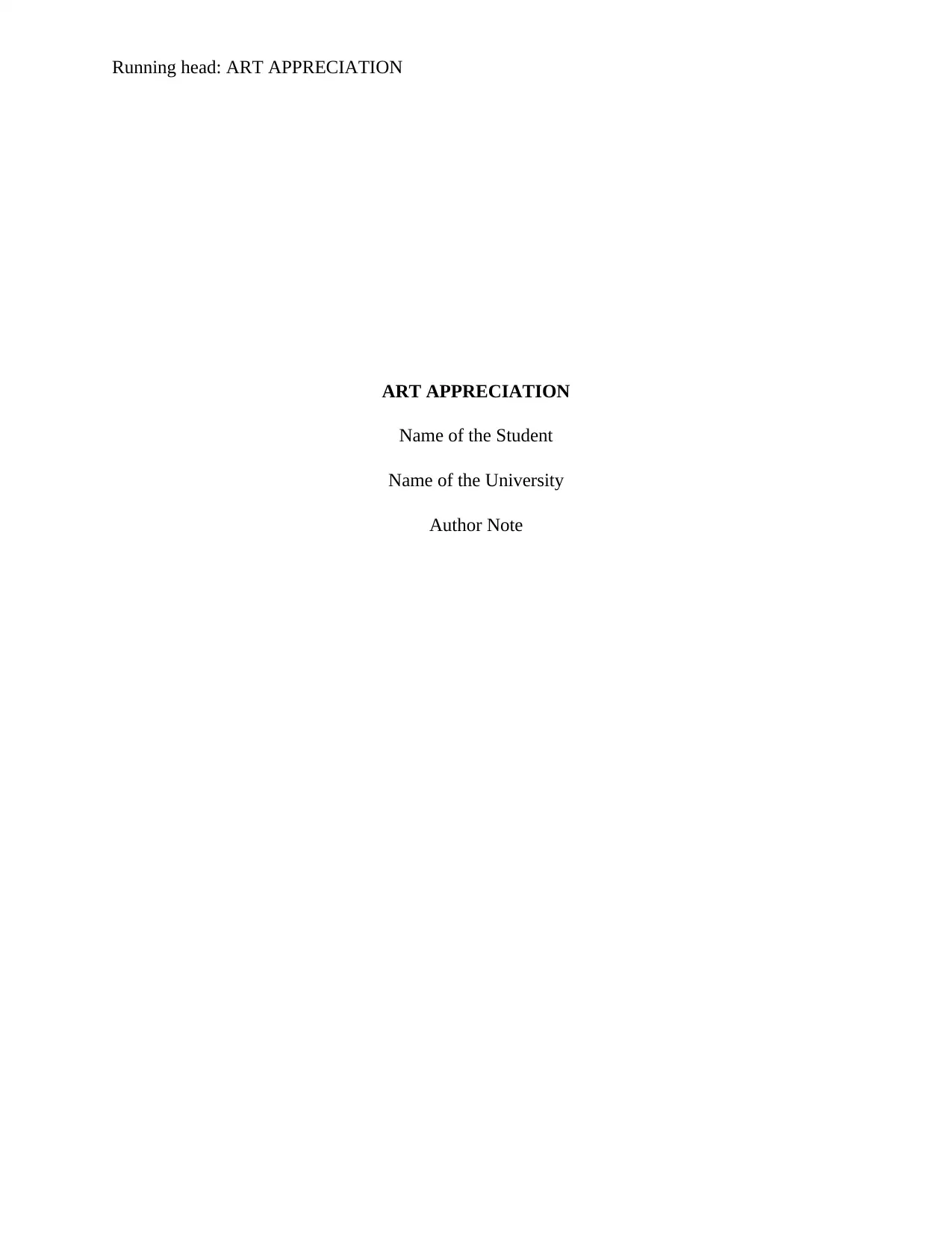
Running head: ART APPRECIATION
ART APPRECIATION
Name of the Student
Name of the University
Author Note
ART APPRECIATION
Name of the Student
Name of the University
Author Note
Paraphrase This Document
Need a fresh take? Get an instant paraphrase of this document with our AI Paraphraser
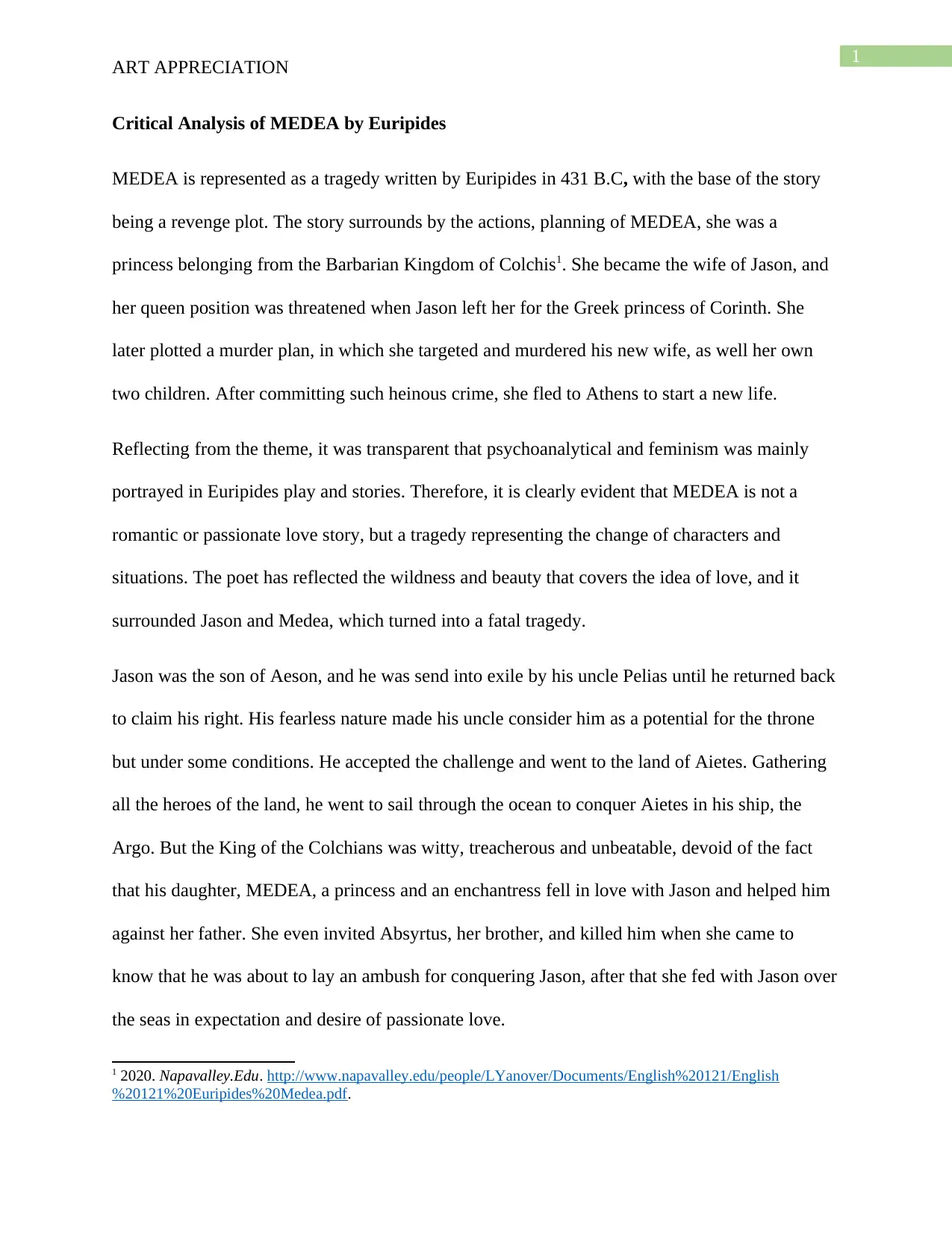
1
ART APPRECIATION
Critical Analysis of MEDEA by Euripides
MEDEA is represented as a tragedy written by Euripides in 431 B.C, with the base of the story
being a revenge plot. The story surrounds by the actions, planning of MEDEA, she was a
princess belonging from the Barbarian Kingdom of Colchis1. She became the wife of Jason, and
her queen position was threatened when Jason left her for the Greek princess of Corinth. She
later plotted a murder plan, in which she targeted and murdered his new wife, as well her own
two children. After committing such heinous crime, she fled to Athens to start a new life.
Reflecting from the theme, it was transparent that psychoanalytical and feminism was mainly
portrayed in Euripides play and stories. Therefore, it is clearly evident that MEDEA is not a
romantic or passionate love story, but a tragedy representing the change of characters and
situations. The poet has reflected the wildness and beauty that covers the idea of love, and it
surrounded Jason and Medea, which turned into a fatal tragedy.
Jason was the son of Aeson, and he was send into exile by his uncle Pelias until he returned back
to claim his right. His fearless nature made his uncle consider him as a potential for the throne
but under some conditions. He accepted the challenge and went to the land of Aietes. Gathering
all the heroes of the land, he went to sail through the ocean to conquer Aietes in his ship, the
Argo. But the King of the Colchians was witty, treacherous and unbeatable, devoid of the fact
that his daughter, MEDEA, a princess and an enchantress fell in love with Jason and helped him
against her father. She even invited Absyrtus, her brother, and killed him when she came to
know that he was about to lay an ambush for conquering Jason, after that she fed with Jason over
the seas in expectation and desire of passionate love.
1 2020. Napavalley.Edu. http://www.napavalley.edu/people/LYanover/Documents/English%20121/English
%20121%20Euripides%20Medea.pdf.
ART APPRECIATION
Critical Analysis of MEDEA by Euripides
MEDEA is represented as a tragedy written by Euripides in 431 B.C, with the base of the story
being a revenge plot. The story surrounds by the actions, planning of MEDEA, she was a
princess belonging from the Barbarian Kingdom of Colchis1. She became the wife of Jason, and
her queen position was threatened when Jason left her for the Greek princess of Corinth. She
later plotted a murder plan, in which she targeted and murdered his new wife, as well her own
two children. After committing such heinous crime, she fled to Athens to start a new life.
Reflecting from the theme, it was transparent that psychoanalytical and feminism was mainly
portrayed in Euripides play and stories. Therefore, it is clearly evident that MEDEA is not a
romantic or passionate love story, but a tragedy representing the change of characters and
situations. The poet has reflected the wildness and beauty that covers the idea of love, and it
surrounded Jason and Medea, which turned into a fatal tragedy.
Jason was the son of Aeson, and he was send into exile by his uncle Pelias until he returned back
to claim his right. His fearless nature made his uncle consider him as a potential for the throne
but under some conditions. He accepted the challenge and went to the land of Aietes. Gathering
all the heroes of the land, he went to sail through the ocean to conquer Aietes in his ship, the
Argo. But the King of the Colchians was witty, treacherous and unbeatable, devoid of the fact
that his daughter, MEDEA, a princess and an enchantress fell in love with Jason and helped him
against her father. She even invited Absyrtus, her brother, and killed him when she came to
know that he was about to lay an ambush for conquering Jason, after that she fed with Jason over
the seas in expectation and desire of passionate love.
1 2020. Napavalley.Edu. http://www.napavalley.edu/people/LYanover/Documents/English%20121/English
%20121%20Euripides%20Medea.pdf.
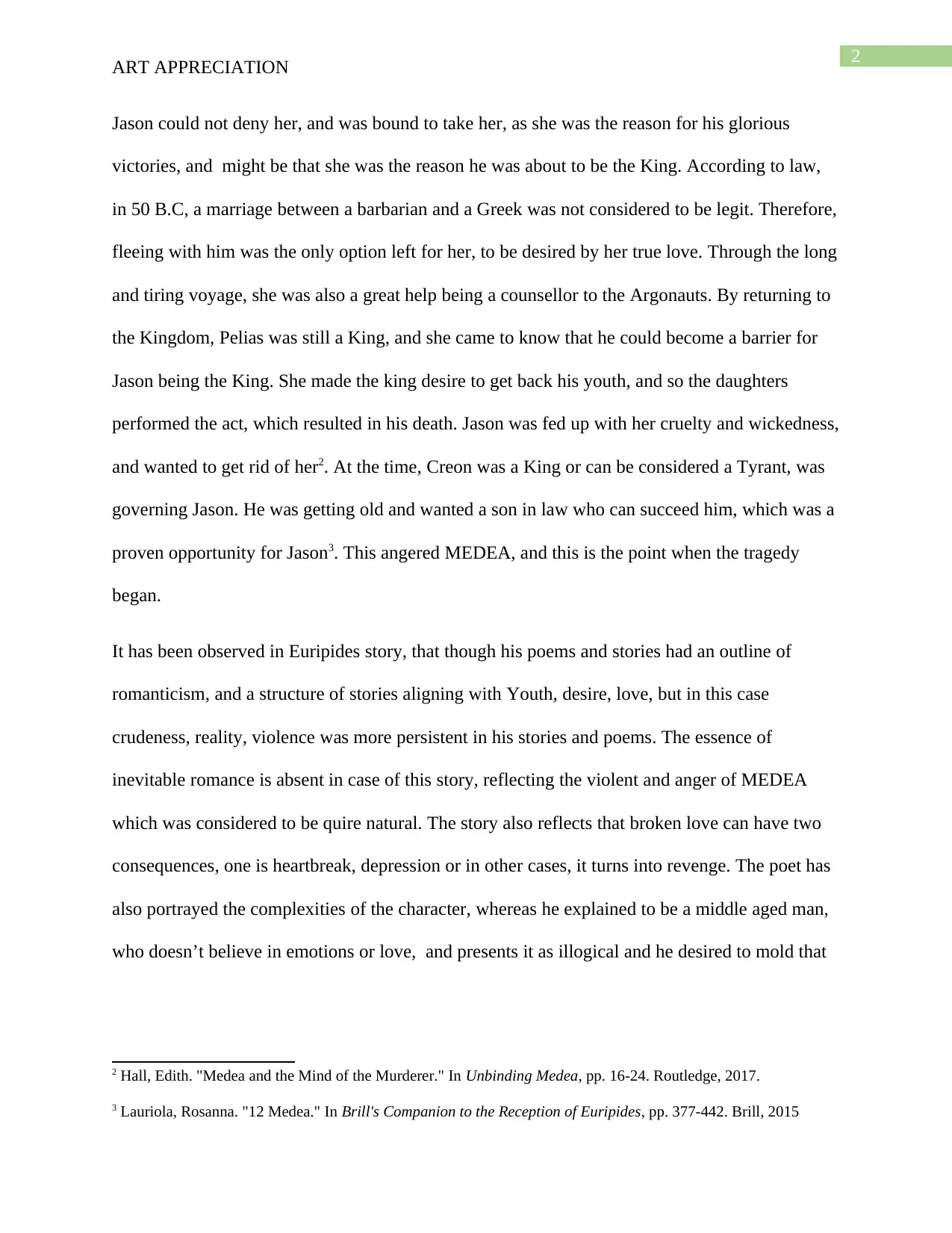
2
ART APPRECIATION
Jason could not deny her, and was bound to take her, as she was the reason for his glorious
victories, and might be that she was the reason he was about to be the King. According to law,
in 50 B.C, a marriage between a barbarian and a Greek was not considered to be legit. Therefore,
fleeing with him was the only option left for her, to be desired by her true love. Through the long
and tiring voyage, she was also a great help being a counsellor to the Argonauts. By returning to
the Kingdom, Pelias was still a King, and she came to know that he could become a barrier for
Jason being the King. She made the king desire to get back his youth, and so the daughters
performed the act, which resulted in his death. Jason was fed up with her cruelty and wickedness,
and wanted to get rid of her2. At the time, Creon was a King or can be considered a Tyrant, was
governing Jason. He was getting old and wanted a son in law who can succeed him, which was a
proven opportunity for Jason3. This angered MEDEA, and this is the point when the tragedy
began.
It has been observed in Euripides story, that though his poems and stories had an outline of
romanticism, and a structure of stories aligning with Youth, desire, love, but in this case
crudeness, reality, violence was more persistent in his stories and poems. The essence of
inevitable romance is absent in case of this story, reflecting the violent and anger of MEDEA
which was considered to be quire natural. The story also reflects that broken love can have two
consequences, one is heartbreak, depression or in other cases, it turns into revenge. The poet has
also portrayed the complexities of the character, whereas he explained to be a middle aged man,
who doesn’t believe in emotions or love, and presents it as illogical and he desired to mold that
2 Hall, Edith. "Medea and the Mind of the Murderer." In Unbinding Medea, pp. 16-24. Routledge, 2017.
3 Lauriola, Rosanna. "12 Medea." In Brill's Companion to the Reception of Euripides, pp. 377-442. Brill, 2015
ART APPRECIATION
Jason could not deny her, and was bound to take her, as she was the reason for his glorious
victories, and might be that she was the reason he was about to be the King. According to law,
in 50 B.C, a marriage between a barbarian and a Greek was not considered to be legit. Therefore,
fleeing with him was the only option left for her, to be desired by her true love. Through the long
and tiring voyage, she was also a great help being a counsellor to the Argonauts. By returning to
the Kingdom, Pelias was still a King, and she came to know that he could become a barrier for
Jason being the King. She made the king desire to get back his youth, and so the daughters
performed the act, which resulted in his death. Jason was fed up with her cruelty and wickedness,
and wanted to get rid of her2. At the time, Creon was a King or can be considered a Tyrant, was
governing Jason. He was getting old and wanted a son in law who can succeed him, which was a
proven opportunity for Jason3. This angered MEDEA, and this is the point when the tragedy
began.
It has been observed in Euripides story, that though his poems and stories had an outline of
romanticism, and a structure of stories aligning with Youth, desire, love, but in this case
crudeness, reality, violence was more persistent in his stories and poems. The essence of
inevitable romance is absent in case of this story, reflecting the violent and anger of MEDEA
which was considered to be quire natural. The story also reflects that broken love can have two
consequences, one is heartbreak, depression or in other cases, it turns into revenge. The poet has
also portrayed the complexities of the character, whereas he explained to be a middle aged man,
who doesn’t believe in emotions or love, and presents it as illogical and he desired to mold that
2 Hall, Edith. "Medea and the Mind of the Murderer." In Unbinding Medea, pp. 16-24. Routledge, 2017.
3 Lauriola, Rosanna. "12 Medea." In Brill's Companion to the Reception of Euripides, pp. 377-442. Brill, 2015
⊘ This is a preview!⊘
Do you want full access?
Subscribe today to unlock all pages.

Trusted by 1+ million students worldwide
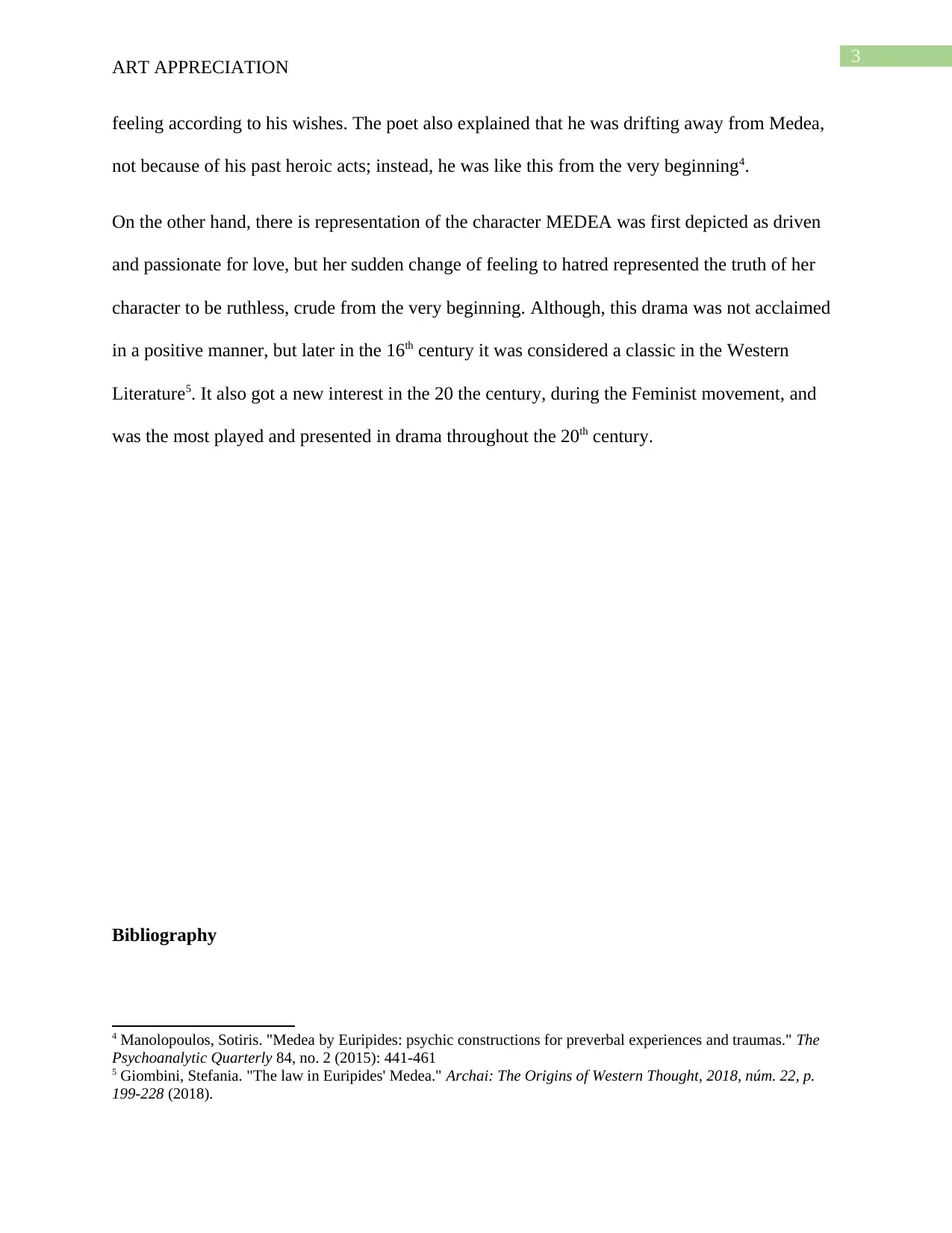
3
ART APPRECIATION
feeling according to his wishes. The poet also explained that he was drifting away from Medea,
not because of his past heroic acts; instead, he was like this from the very beginning4.
On the other hand, there is representation of the character MEDEA was first depicted as driven
and passionate for love, but her sudden change of feeling to hatred represented the truth of her
character to be ruthless, crude from the very beginning. Although, this drama was not acclaimed
in a positive manner, but later in the 16th century it was considered a classic in the Western
Literature5. It also got a new interest in the 20 the century, during the Feminist movement, and
was the most played and presented in drama throughout the 20th century.
Bibliography
4 Manolopoulos, Sotiris. "Medea by Euripides: psychic constructions for preverbal experiences and traumas." The
Psychoanalytic Quarterly 84, no. 2 (2015): 441-461
5 Giombini, Stefania. "The law in Euripides' Medea." Archai: The Origins of Western Thought, 2018, núm. 22, p.
199-228 (2018).
ART APPRECIATION
feeling according to his wishes. The poet also explained that he was drifting away from Medea,
not because of his past heroic acts; instead, he was like this from the very beginning4.
On the other hand, there is representation of the character MEDEA was first depicted as driven
and passionate for love, but her sudden change of feeling to hatred represented the truth of her
character to be ruthless, crude from the very beginning. Although, this drama was not acclaimed
in a positive manner, but later in the 16th century it was considered a classic in the Western
Literature5. It also got a new interest in the 20 the century, during the Feminist movement, and
was the most played and presented in drama throughout the 20th century.
Bibliography
4 Manolopoulos, Sotiris. "Medea by Euripides: psychic constructions for preverbal experiences and traumas." The
Psychoanalytic Quarterly 84, no. 2 (2015): 441-461
5 Giombini, Stefania. "The law in Euripides' Medea." Archai: The Origins of Western Thought, 2018, núm. 22, p.
199-228 (2018).
Paraphrase This Document
Need a fresh take? Get an instant paraphrase of this document with our AI Paraphraser
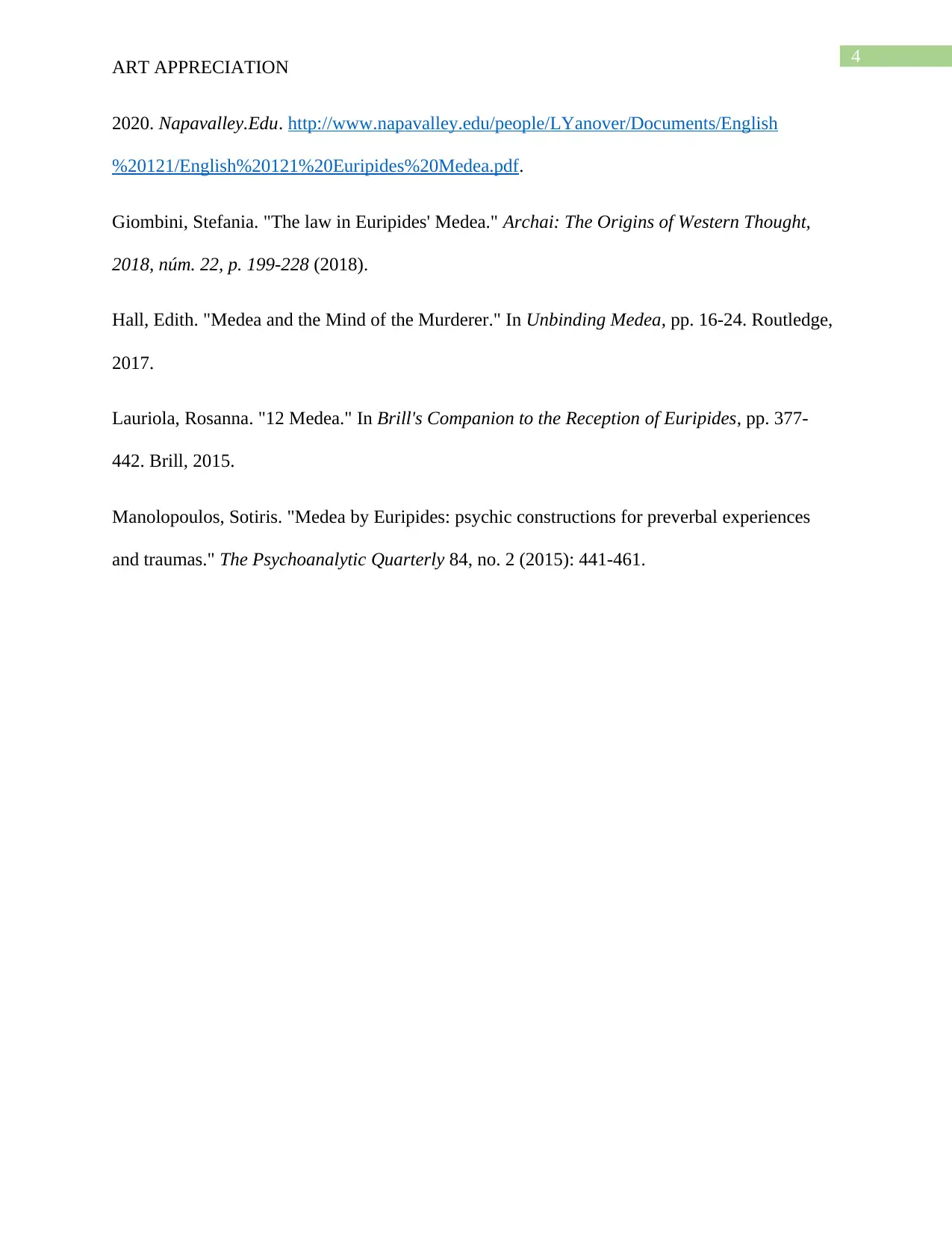
4
ART APPRECIATION
2020. Napavalley.Edu. http://www.napavalley.edu/people/LYanover/Documents/English
%20121/English%20121%20Euripides%20Medea.pdf.
Giombini, Stefania. "The law in Euripides' Medea." Archai: The Origins of Western Thought,
2018, núm. 22, p. 199-228 (2018).
Hall, Edith. "Medea and the Mind of the Murderer." In Unbinding Medea, pp. 16-24. Routledge,
2017.
Lauriola, Rosanna. "12 Medea." In Brill's Companion to the Reception of Euripides, pp. 377-
442. Brill, 2015.
Manolopoulos, Sotiris. "Medea by Euripides: psychic constructions for preverbal experiences
and traumas." The Psychoanalytic Quarterly 84, no. 2 (2015): 441-461.
ART APPRECIATION
2020. Napavalley.Edu. http://www.napavalley.edu/people/LYanover/Documents/English
%20121/English%20121%20Euripides%20Medea.pdf.
Giombini, Stefania. "The law in Euripides' Medea." Archai: The Origins of Western Thought,
2018, núm. 22, p. 199-228 (2018).
Hall, Edith. "Medea and the Mind of the Murderer." In Unbinding Medea, pp. 16-24. Routledge,
2017.
Lauriola, Rosanna. "12 Medea." In Brill's Companion to the Reception of Euripides, pp. 377-
442. Brill, 2015.
Manolopoulos, Sotiris. "Medea by Euripides: psychic constructions for preverbal experiences
and traumas." The Psychoanalytic Quarterly 84, no. 2 (2015): 441-461.
1 out of 5
Related Documents
Your All-in-One AI-Powered Toolkit for Academic Success.
+13062052269
info@desklib.com
Available 24*7 on WhatsApp / Email
![[object Object]](/_next/static/media/star-bottom.7253800d.svg)
Unlock your academic potential
Copyright © 2020–2026 A2Z Services. All Rights Reserved. Developed and managed by ZUCOL.



